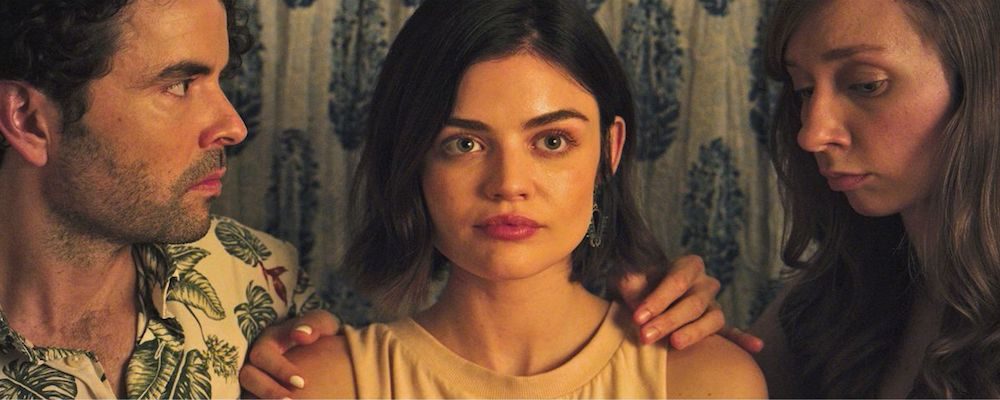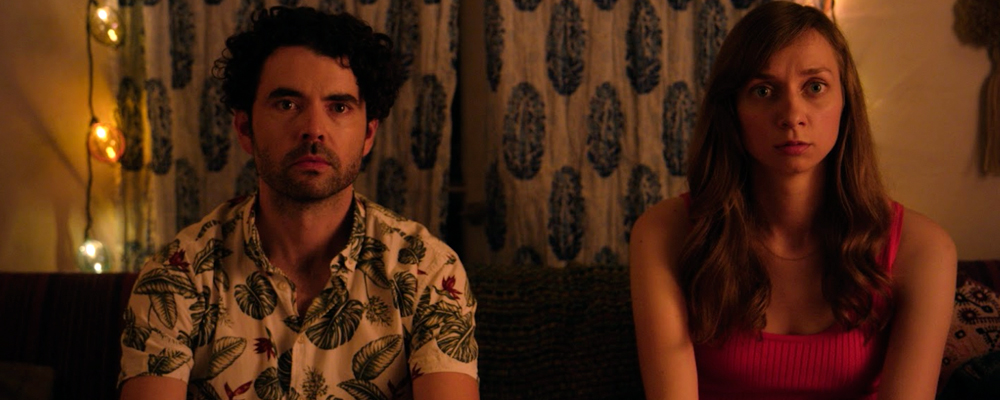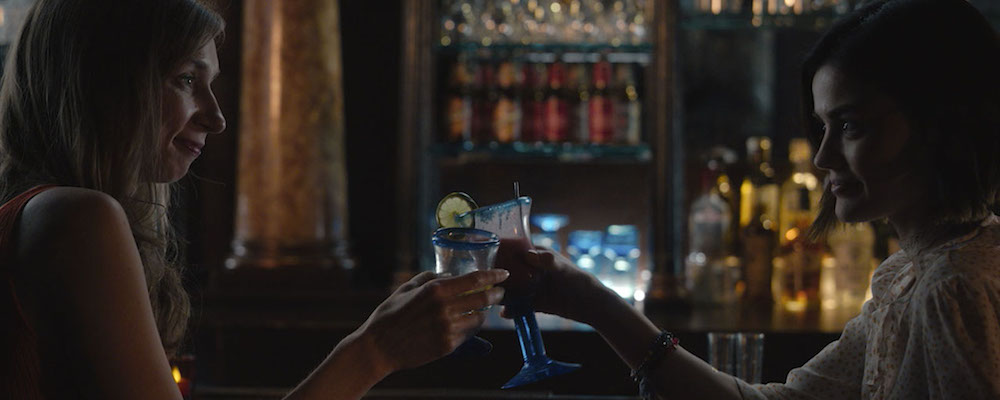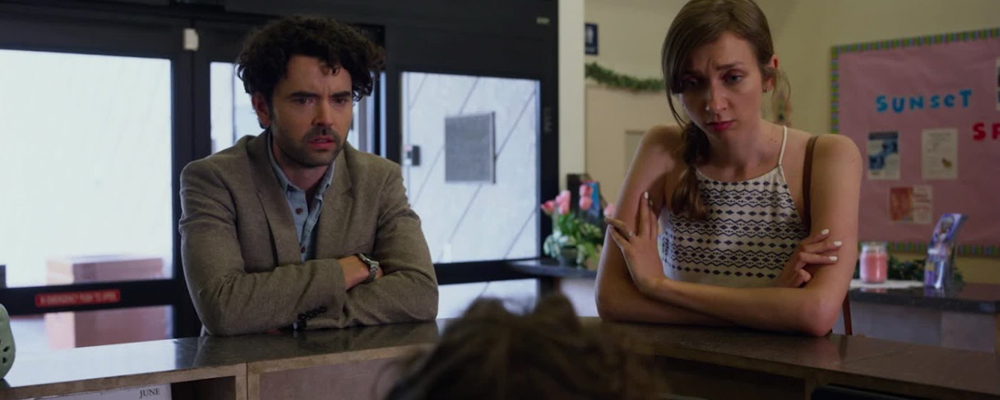Nick Rutherford and Lauren Lapkus Take on Sex and Relationships in Threesome Comedy ‘The Unicorn’
Sandra Miska
The inevitable relationship slump faced by long-term couples in their thirties is explored in “The Unicorn,” a sex positive indie comedy tailor-made for elder millennials. Nick Rutherford and Lauren Lapkus star as Cal and Maloryl, a thirtysomething couple who have been together for a long time even by the standards of their generation — seven years. Despite having been engaged for four years, they have no wedding date in sight. The differences between the generations come through loud and clear here, as Cal and Mal aren’t motivated to evaluate the state of their relationship until a lecture from her mother, Edie (Beverly D’Angelo), on the eve of her vow renewal with Mal’s stepdad, Louis (John Kapelos).
Despite the value they put on tradition, Edie and Louis are into threesomes, a tidbit Cal and Mal discover from a drunk friend. While most people would want to bleach their brains after hearing such talk about their parents’ sexual proclivities, Cal and Mal are inspired to seek out a third party, or “unicorn,” of their own. Despite the premise, “The Unicorn” is not another raunchy sex comedy full of antics. Instead, it is character-driven and smart as the filmmakers no reason why the unicorn has to be a woman.
“The initial script did take place on Mars, but that got nixed due to budget,” joked Rutherford, who also co-wrote the screenplay along with Will Elliott and Kirk C. Johnson.
Rutherford recounted how the seed of the idea initially came to director Robert Schwartzman after a night out with his girlfriend. The couple was approached by a woman who introduced herself as a “unicorn,” a person who dates couples, or as she put it, that “mythical thing that is too good to be true.”
“I had never heard of that before,” recalled Rutherford. “I was in a relationship at the time, and we were kind of at that, forgive my language, ‘shit or get off the pot’ moment, so it kind of resonated. You’re in this situation where you don’t know what’s wrong, you don’t know if anything is wrong, and yet something’s not right and you’re trying to suss that out. I think, at the right time or wrong time, depends on how you look at it, if somebody presented an option of [a threesome], you might be in a position to say, ‘This is what we need.’”
Rutherford’s long-term relationship came to an end during the writing stage of “The Unicorn,” and the end result was the creation of something very personal to him, maybe even too personal, as he explained.
“I think there’s maybe an unhealthy amount of me in Cal. He wants to be the best, but he’s still human and he doesn’t know exactly what that even means, and he wants to provide the best for his partner, and is conflicted with what the norms of a relationship are and what the expectations of it are.”
Despite being so close to the script, Rutherford wasn’t too precious about it, according to Lapkus.
“He was really open to changing things and letting it feel very natural to both of us. He was also just really fun to joke around with. It was a really easy set, and we were all able to add our personalities to the film.”
Likewise, Rutherford praised Lapkus for setting such a high bar when it came to getting laughs.
“We couldn’t have gotten luckier when we found her. So much of it was, being in these scenes with all these other comedic powerhouses, everybody needed to hold their own. I think everybody really needed to step up and be as funny as Lauren. She was a dream.”
“The Unicorn” reunites Rutherford with long-time collaborators Beck Bennett and Kyle Mooney. After forming their sketch comedy group Good Neighbor in 2007, the trio, along with director Dave McCary, took advantage of the then-new platform YouTube, showcasing their offbeat brand of humor on what was to become a wildly popular channel.
Bennett plays Tyson, the sexually liberated owner of a male strip club. Cal and Mal end up partying with him after a failed attempt at a hook-up with bohemian local Jesse (Lucy Hale). The open-minded Cal is pushed to the limit of his comfort zone in an effort to please Mal here, and the whole thing ends on an oddly touching note. The scene hinged on Bennett being able to make Rutherford and Lapkus as uncomfortable as possible, a task he took to heart.
“Beck completely brought it to that scene,” recalled Rutherford. “The discomfort shows, and the silliness and awkwardness shows a lot, and that’s all because of Beck and his willingness to just go there.”
Lapkus added how trust between the actors was the key while filming this scene.
“[We said], ‘It’s okay if you touch me. Do whatever you have to do to get the joke across.’… All the stuff with Beck made me laugh so much. He’s so funny.”
Mooney, meanwhile, pops up in a less sexually-charged, yet equally funny scene set in a nursing home. Rutherford explained how working with Bennett and Mooney again felt just like making another one of their Good Neighbor sketches, albeit on a larger scale.
“We’ve worked together for years. I think you just slip back into it and it just becomes, ‘Here we go, let’s make each other laugh and try to laugh after they call cut.’”
Despite the fun had by the men, “The Unicorn” is by no means another testosterone-fueled sex comedy. Rutherford and his co-writers managed to avoid the usual clichés by giving Mal just as much sexual agency as her guy.
“We were all very adamant about not wanting it to be a film where Cal is saying, ‘Hey, let’s go out and have a threesome,’ and Malory is [unsure]… We wanted it to be that Malory is feeling something, and she’s exploring this, and she’s going after it, and she doesn’t know what it means, but she’s open to it, and Cal is going to go as far as he can with it.”
It is this fresh approach that first attracted Lapkus to the project.
“I really liked the ways that they handled the sexuality and the relationship, and the [journey] that this couple is going through. I thought it was really handled in such a funny way while also not just resorting to typical cliché moments that a lot of movies have when you go down that threesome road.”
“The Unicorn” will especially resonate with elder millennials, who more and more are delaying marriage and staying in long-term relationships. The notion that societal expectations can be detrimental to a union is explored here, as Mal especially is pressured by her family to conform and be like her sister (Maya Kazan), a pregnant wife.
Said Rutherford, “Beverly D’Angelo plays this very strongly opinionated mother who is like, ‘You gotta get married… I don’t recognize [the relationship] without it.’ That’s obviously a very far extreme. And then there’s Beck’s character, who [believes] sexuality is lucid and it’s on a spectrum… I lean more towards that. When you define something, there’s an expectation of what that thing will be, and I think that always just gets people in trouble, or at least hurts people.”
“I think that’s something that we kind of take for granted about our generation a little bit, that we all are waiting longer to do everything, for the most part, especially in big cities,” answered Lapkus when asked about relationship trends among millennials. “I live in L.A., so a lot of my friends are waiting until they reach a certain point in their career before they get married, or they want to reach a certain point before they have a kid, and age becomes less of a factor.”
Lapkus points out that one just has to look at films of the not-so-far past to see just how much attitudes toward marriage have changed.
“In movies like ‘My Best Friend’s Wedding,’ they’re like, ‘If we’re not married by the time we’re 30, let’s marry each other.’ We don’t really think of it like that way anymore.”
“The Unicorn” opens in select theaters Feb. 1, On Demand Feb. 5.




